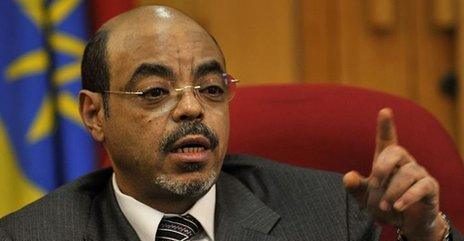
Why PM Meles Must Listen
By Desta Heliso
That Ethiopia is in deep trouble is a statement of the obvious. But I am very fearful that it may plunge into even deeper troubles if PM Meles continues to fail to listen. The international community and many Ethiopians have called on him (and his government) to release the opposition leaders of the Coalition for Unity and Democracy (CUD), civil society workers and journalists from prison and drop the ‘treason’ and ‘genocide’ charges brought against them. He thus far has refused to listen to all of them, even to his ‘friends’ in Europe and America. But he must listen.
He must listen, because the grounds for jailing and charging the people in question are purely and simply political. It is a strategy adopted by his government to frustrate and probably weaken the opposition. But it is a strategy that will prove to be very dangerous indeed. I for one was against CUD’s post-election stance, particularly their refusal to take parliamentary seats they won and assume the administration of Addis Ababa. That, as some objective observers will agree with me, was a historic mistake. But one political mistake cannot be rectified by another even more serious political mistake. Anyone who has some knowledge about Ethiopian politics and has read the details of the charges brought against the jailed opponents of EPRDF can immediately figure out that the language and the essence of the charges are politically loaded. Indeed, even those who are not legal experts like me can judge that the charges have very little legal substance. This has resulted in the prosecution team having to engage in some embarrassing U-turns and amendments. From the very start, the government has really displayed silly cleverness. That has further damaged its integrity. And it is threatening to do probably a long-term damage to the national unity and integrity of our country.
What is being played out in the national political and legal arena at the moment is the same sort of strategy that EPRDF adopted in an area in Southern Ethiopia about six years ago. I call this area ‘area X’. EPRDF encountered stiff opposition in this area during parliamentary and regional council elections. When the government realised that it was going to lose control of the councils and parliamentary seats in that area, it sent special- forces from Addis Ababa to help intimidate and, if necessary, crack down on opposition supporters. About a dozen civilians died. But nevertheless EPRDF was rendered an endangered species in the area, as its candidates lost in all constituencies but one. Despite that, however, EPRDF continued to administer area X. The EPRDF representatives might have had a reason for doing so, but they did not give sufficient and convincing explanations to the opposition. That inevitably created further unrest and engendered resentment amongst the populace. Clashes took place between the people and security forces. Then here is an interesting parallel between what happened then and what is happening now: EPRDF representatives in area X, no doubt in accordance with instructions they were given from the party’s headquarters in Addis, immediately decreed that the opposition were engaged in insurrection. Many opposition leaders were jailed. They appeared in court many times, but no credible charges were brought against them. Indeed, the prosecution team had little or nothing to say during the court proceedings.
Then when the opposition were believed to pose little or no political threat to EPRDF, they were released. And no explanation was given. Nor was any explanation necessary. The reason was well-known. The whole move from beginning to end was politically motivated, pure and simple. What happened in area X six years ago is a microcosm of what is currently happening at the national level. But it is completely and utterly inconsistent with the spirit of democracy. It should not have happened then. It should not happen now. PM Meles must listen.
He must listen also because keeping his political opponents in jail is exacerbating the already existing regional volatilities. I am thinking of problems relating, for example, to Oromo Liberation Front (OLF), Ogaden National Liberation Front (ONLF), Gambella People’s Liberation Movement (GPLM) and the Sidammas’ question for their own regional assembly. These problems cannot be dealt with positively and pragmatically, because the aftermath of the last election is allowed to linger on. The government hoped that election-related problems would go away if it sponsored the failed attempts of some CUD politicians to take over the Addis administration. But even if those attempts had been successful, the problems would not have gone away. Fundamental problems cannot be resolved through political tactics that are at best superficial, at worst sinister. Fundamental problems require fundamental solutions. It is true that everyone’s question cannot be answered in the way everyone would like it to be answered. But the questions of any group must not be suppressed or ignored. They must be given due consideration if they are believed to affect in any way our country’s peace, development and fragile unity. But that effort is not going to be possible because of the sort of political climate that is being created because of the persistent refusal of PM Meles to release his political opponents. This, in my view, is further complicating issues relating to OLF, ONLF, GPLM and the Sidamma question. It will also provide grounds for the creation of more ‘liberation fronts’ that will be sponsored by anyone with vested interest in Ethiopia’s instability and disunity. Internal discontent may continue to grow. Unrests in schools and universities may not go away. Those unrests may even spill over into other spheres: villages and towns, civic institutions and national defence forces. Then, God forbid, it will be a matter of time for things to get out of hand.
I am not saying that releasing political detainees will be the only solution for Ethiopia’s complex problems. That action must be followed by other positive and pragmatic actions such as creating conducive political environment and engaging in peace-talks with OLF and others. It would be wrong to ignore groups such as OLF and ONLF and hope that hey will die away. That OLF, for example, has survived for so long is evidence that these groups won’t simply disappear. Let me give another example. Successive British governments hoped that Irish Republican Army (IRA) that engaged in armed struggle and terrorist activities would be finished if it was successfully contained. But it was not finished; nor was it always successfully contained. After three decades, the British government under Blair took pragmatic steps and engaged in peace-talks with the political wing of IRA called Sinn Fein. That resulted in the so-called Good Friday Peace Accord. It also resulted in Sinn Fein becoming part of the political system where it managed to win seats in both national and regional assemblies. It continues to speak for the unification of Northern Ireland and Republic of Ireland. Sinn Fein is still vehemently opposed to the British government administering Northern Ireland. But it does that through peaceful and political means. Some problems continue to exist, of course. But IRA has now decommissioned its arms and is disbanded as an armed-resistance movement. That would not have been achieved had not Blair taken pragmatic steps rather than getting stuck to the unrealistic principle of ‘disarmament before peace-talks’. PM Meles must learn from and listen to PM Blair.
There is another reason why Ato Meles must listen. Ethiopia is losing the immense international goodwill that it enjoyed up until June 2005. We cannot afford to lose that. Not only for the obvious reason that Ethiopia, as one of the poorest countries in the globe, needs continued international assistance on socio-political and economic fronts. But also losing international goodwill means losing partners. Maintaining our partnership with nations that care about democracy and social justice should always be our government’s strategic priority. Recently, the Ambassadors’ Donor Group has again urged reconciliation and dialogue among all those engaged in the democratic process in Ethiopia. They reminded us again that tolerance of dissenting views is a hallmark of democracy. They advocated the release of the imprisoned political opponents of the Meles government. But no action has been taken in response to this latest call. I don’t know what PM Meles knows about the real politick on the ground. But I do know that by refusing to heed the calls of the international community and his own people to release those imprisoned CUD leaders and representatives of media and civil society, he is making a big political mistake that may have negative ramifications for our country’s future. Leaders should provide effective leadership. They should also listen. This is a time for PM Meles to listen. Of course, he should be firm in matters of principles. But he should also be flexible and pragmatic for the sake of Ethiopia’s peace, unity and development.


